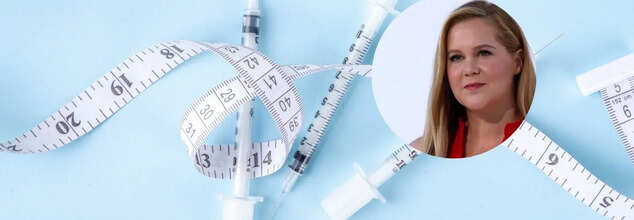
Credit: Canva
Amy Schumer Says She Faced Side Effects From Wegovy, Switched To Mounjaro
Writer, actress and stand-up comedian Amy Schumer recently took to Instagram to discuss her experiences with the GLP-1 drugs Wegovy (semaglutide) and Mounjaro (tirzepatide). She has often opened up about her weight loss journey, and this time, she shared her experience with GLP-1 agonist drugs and the side effects she faced. This comes days after a study claimed that the blockbuster weight loss drugs also led to serious side effects like reduction in bone density.
Shrumer also revealed that switching to Mounajro from WeGovy has resulted in a higher sex drive. "I want to get down more," she added, referring to the positive effect on her libido. “So, yeah, that’s been great. Mounjaro’s been great," Schumer said in an online video.
Why did Schumer do better on Mounjaro than Wegovy?
Following the video, many people on the internet raised questions on why Shrumer did better on one drug than other. Commenting on the same, Meghan Garcia-Webb, MD, an obesity medicine doctor at Weight Medicine MD, told Healthline that people may have different side effects with GLP medications. It is also not uncommon to have side effects with one but not with other. "It is hard to predict who will be able to tolerate them and who won’t," she said, "although people who already struggle with gastrointestinal health issues may find these medications make them worse."
What Are Common Side Effects Of Wegovy
- nausea
- diarrhea
- vomiting
- constipation
- abdominal pain
- upset stomach
- headache
- tiredness
- dizziness
- bloating
- belching
- low blood sugar (if you have type 2 diabetes)
- gas
- stomach flu
- heartburn
- runny nose or sore throat
Common Side Effects Of Mounjaro
- Nausea

Credits: Canva
Before You Start IVF, 7 Critical Factors You Must Consider
For millions around the world, infertility is not just a medical diagnosis—it’s an emotionally complex and often deeply isolating experience. The decision to undergo In Vitro Fertilisation (IVF) can be a pivotal turning point, filled with both hope and uncertainty. While IVF offers a scientific pathway to parenthood, it also demands serious preparation—medically, emotionally, and financially.
Introduced in 1978 with the birth of Louise Joy Brown, the first "IVF baby," the procedure has since led to over 5 million births globally. But its success isn't guaranteed. “IVF is a sophisticated process, and understanding what you’re getting into—right from the number of cycles required to the lifestyle changes involved—can significantly influence the outcome,” explains Dr. Sonu Taxak, IVF Specialist.
So, before you begin your IVF journey, here are seven essential factors every individual or couple should consider.
1. Know the Success Rates—And What Influences Them
The first and most important question many hopeful parents ask is: What are my chances of success? IVF success rates can vary significantly, especially depending on a woman’s age. Women under 35 generally have a 50–60% success rate per cycle, but those over 40 often see a steep drop.
“Factors such as age, hormonal health, ovarian reserve, and even the male partner’s sperm quality affect outcomes,” says Dr. Taxak. “That’s why individualized assessments are critical.” Prospective patients should request their clinic’s latest success data, segmented by age and fertility diagnosis, to get a realistic picture.
2. Be Financially Prepared for the Costs Involved
IVF isn’t just emotionally demanding—it’s financially intense. While a single cycle may cost between ₹1.5 to ₹3 lakh (approx. $1,800–$3,600 USD in India), many people require multiple cycles to conceive. Costs in the US or Europe can be even higher, often ranging between $12,000 and $20,000 per cycle.
“Patients must plan for both success and setbacks,” advises Dr. Taxak. Some clinics offer financial assistance like the Yellow Contract, which caps expenses for additional cycles. Also, check if your insurance covers any part of the treatment or if your clinic offers EMI/payment plans.
3. Assess Your Physical and Emotional Readiness
Undergoing IVF is not just a clinical procedure—it is a rigorous physical and emotional process. Patients typically undergo hormone therapy, regular injections, blood tests, egg retrieval, and embryo transfer—all of which can be taxing.
“The mental health aspect is often overlooked,” warns Dr. Taxak. “Many couples experience anxiety, mood swings, or depression, especially when treatments don’t go as planned.” Connecting with IVF counselors, joining fertility support groups, or even engaging in regular therapy can ease this burden.
4. Make Lifestyle Changes That Improve Success Odds
It’s essential to optimize your body for IVF before beginning. This includes embracing nutritional changes, getting enough sleep, and minimizing exposure to toxins. “Focus on a diet rich in antioxidants, omega-3s, lean protein, and healthy fats,” recommends Dr. Taxak.
Avoid smoking, alcohol, and high caffeine intake, all of which can negatively impact fertility. Gentle exercises like walking or yoga can aid circulation and reduce stress, but avoid high-impact workouts, which can lead to complications like ovarian torsion during stimulation phases.
5. Choose the Right IVF Clinic and Medical Team
Not all fertility clinics are equal. Success in IVF is not just about technology but also expertise, transparency, and support. “Look for clinics that are transparent about their success rates, offer personalized care, and have a dedicated team for patient support,” says Dr. Taxak.
Investigate the clinic’s approach to embryo freezing, lab standards, doctor qualifications, and aftercare. Read reviews and request testimonials if needed. Your clinic should not just be a facility—it should feel like a supportive partner in your journey.
6. Understand That Multiple Cycles May Be Required
While many couples hope for success in the first round, the reality is often different. Statistically, more than 60% of successful IVF pregnancies occur after the second or third cycle.
“Setting realistic expectations is key,” notes Dr. Taxak. “Sometimes, the first round helps gather valuable data that improves the chances in subsequent cycles.” Having the mental and financial flexibility for more than one attempt is vital for long-term success.
7. Build a Strong Emotional Support System
IVF is not a solo journey—even if you’re doing it alone. Having a strong support system is critical. This includes open communication with your partner, family, or trusted friends.
“The emotional toll can be immense, especially when things don’t go as expected. Having someone who understands and supports you can make a world of difference,” says Dr. Taxak. Emotional stability can also impact hormonal balance, indirectly influencing IVF success.
Starting IVF is a deeply personal and life-changing decision. But when approached with education, planning, and support, it transforms from a clinical treatment into a hopeful step toward parenthood.
With advances in fertility science and more people opening up about their IVF journeys, the stigma is slowly fading. As you prepare for your own, consider each of these factors carefully—and know that you’re not alone in your path to parenthood.
Dr. Sonu Taxak is a leading IVF specialist and Director at Yellow IVF in India

Credits: Canva
These Habits Could Keep Dementia At Bay
From slurping daily spoonfuls of fish oil to giving up alcohol, many Americans are trying a lot of new things to keep their minds sharp. The list of activities go on, including lifting weights, and solving puzzles. These are done all for good reasons; Americans do not want their brains to slow down. The fear is real too, as dementia, especially Alzheimer's disease is on the rise. 6.7 million Americans today live with Alzheimer's and the number is expected to double in every 20 years.
Given these numbers, researchers are now exploring new ways to delay or prevent cognitive decline. While no one strategy guarantees to prevent dementia, there are certain lifestyle habits that could keep it at bay. Here are some:
Train Your Brain With Puzzles And Word Games
Crossword puzzles, Sudoku, Wordle, or strategy-based games — anything that gets your mind moving — could be helpful in keeping your brain agile. Although scientific proof is limited, regular mental stimulation is widely considered beneficial.
“Reading, learning new things, talking to people, just engaging the brain in many different ways is good for your brain,” said Dr. Andrew Newberg, a neuroscientist at Florida Atlantic University's Stiles-Nicholson Brain Institute to a media outlet. The key? Variety. Don’t fall into a mental routine — change it up often to keep your brain on its toes.
Your Sleep Must Be a Priority
Sleep plays an important role in your brain health, it also gives your brain the time it needs to rest, reset, and clean out all or any harmful toxins that build up during the day. Dr Daniel Vela-Duarte, a neuro-interventional surgeon also suggests to keep a consistent sleep schedule. He also suggests to exposure yourself to natural light within the first 30 minutes of waking up. It must be your aim to get at least 15 to 30 minutes of morning sunlight to help regulate your sleep-wake cycle.
Food For Brain
It is not a new concept. There are many different foods that work well for your brain. What you eat matters just as much for your brain as it does for your body. Healthy balanced diet could also reduce inflammation and keep arteries, including the ones that lead to your brain clean and functioning well.
What You Can Do:
- Include more fruits in your diet. You can also include vegetables, nuts, and whole foods.
- Cut down on added sugar and processed items.
- Choose foods which are rich in magnesium and omega-3 fatty acids.
In fact, a 2023 study published in Springer Nature, titled: Dietary magnesium intake is related to larger brain volumes and lower white matter lesions with notable sex differences, found that magnesium-rich foods may lower dementia risk, especially in women. Cold-water fish (like salmon and sardines) rich in omega-3s are also linked to improved thinking skills and better brain function.
Also, experts advise limiting alcohol, as it can interfere with brain structure and performance.
Keep Moving Your Body
Exercise benefits not only your heart and muscles but also your mind. Physical activity boosts chemicals in the brain that promote mental sharpness and helps preserve memory and thinking functions.
Research shows that people who exercise tend to have larger brain regions responsible for thinking and memory. Nicole Baganz of the FAU Stiles-Nicholson Brain Institute emphasizes that any type of movement helps — whether it’s walking, lifting weights, or even chair yoga. The goal? Get moving regularly, even if it’s just a brisk walk around the block.
Stay Socially Connected
Don’t underestimate the power of good company. Social isolation and loneliness are known to negatively affect mental health and speed up cognitive decline. Connecting with others through conversations, activities, or volunteering helps keep the brain engaged.
“Loneliness is one of the worst things that can happen to the brain,” says Baganz. Reconnecting with old hobbies or learning something new — like a language or musical instrument — can also provide mental stimulation and help build new neural pathways.

Credit: Canva
Should You Wash Your Face With Salt Water?
In the realm of skincare, home remedies have long been a go-to for many, and one such trend gaining popularity is washing the face with salt water. From acne reduction to skin detoxification, the humble salt solution is being praised on social media. But does it really live up to the hype? And more importantly, is it safe for everyday use?
Salt water, particularly when derived from natural sea water, contains minerals like magnesium, calcium, and potassium. These elements are known for their antibacterial and anti-inflammatory properties. This is one reason why a dip in the ocean often leaves the skin feeling refreshed and rejuvenated. Some people replicate this effect at home by mixing sea salt with warm water and using it as a facial rinse.
Dermatologists agree that salt water does have certain benefits—when used in moderation. “Salt water can help cleanse the skin, reduce oiliness, and calm mild inflammation,” says Dr. Nisha Verma, a Mumbai-based dermatologist. “It can be particularly useful for people with acne-prone or oily skin because salt has natural antiseptic properties that can help reduce bacteria and unclog pores.”
However, experts caution against daily use or using high concentrations of salt. Salt is a natural dehydrator—it draws water out of cells. This means overuse can strip the skin of its natural moisture, leading to dryness, irritation, or even flaking. People with dry, sensitive, or eczema-prone skin are especially advised to steer clear of salt-based treatments unless under medical supervision.
In a controlled routine, salt water can be used as a toner or rinse a few times a week. The solution should be mild—usually one teaspoon of sea salt dissolved in half a cup of warm water. After application, it's crucial to moisturize to restore the skin’s hydration barrier.
Anecdotal reports also suggest that salt water may help reduce blackheads and tighten pores, but these claims lack solid scientific backing. “Most of the positive effects are temporary,” says Dr. Verma. “It’s not a substitute for a good skincare routine or prescribed treatment for chronic conditions like acne or rosacea.”
There’s also a growing trend of using Himalayan pink salt or Dead Sea salt for their mineral content. While these may offer a slight edge due to their rich composition, the core principles remain the same—moderation and proper dilution are key.
For those with skin infections or open wounds, dermatologists strongly discourage the use of salt water. It may sting and irritate the area, delaying healing. Similarly, those undergoing treatments like chemical peels or retinol-based regimens should avoid salt rinses as it can lead to increased sensitivity.
In conclusion, while washing your face with salt water may offer certain skin benefits, it is not a one-size-fits-all solution. Used correctly, it can be a helpful occasional addition to your skincare regimen—but relying on it daily or overusing it could do more harm than good.
As always, consult a dermatologist before incorporating any new treatment into your routine—especially one that could affect your skin’s natural barrier.
© 2024 Bennett, Coleman & Company Limited

